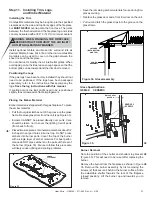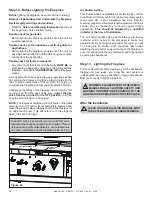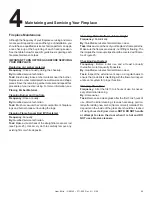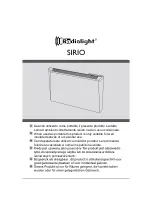
21
Heat & Glo • GEM42 • 371-900 Rev. N • 2/05
For Vertical Terminations -
To locate the vent and install
the vent sections:
• Locate and mark the vent centerpoint on the underside
of the roof, and drive a nail through the centerpoint.
• Make the outline of the roof hole around the centerpoint
nail.
• The size of the roof hole framing dimensions depend on the
pitch of the roof. There
MUST BE
a 1-inch (25.4mm) clear-
ance from the vertical vent pipe to combustible materials.
• Mark the roof hole accordingly.
• Cover the opening of the installed vent pipes.
• Cut and frame the roof hole.
• Use framing lumber the same size as the roof rafters
and install the frame securely. Flashing anchored to the
frame must withstand heavy winds.
• Continue to install concentric vent sections up through
the roof hole (for inside vent installations) or up past the
roof line until you reach the appropriate distance above
the roof (for outside terminations).
Roof Pitch
H (min.) ft.
flat to 6/12
1.0
6/12 to 7/12
1.25
over 7/12 to 8/12
1.5
over 8/12 to 9/12
2.0
over 9/12 to 10/12
2.5
over 10/12 to 11/12
3.25
over 11/12 to 12/12
4.0
over 12/12 to 14/12
5.0
over 14/12 to 16/12
6.0
over 16/12 to 18/12
7.0
over 18/12 to 20/12
7.5
over 20/12 to 21/12
8.0
Figure 22. Minimum Height from Roof to
Lowest Discharge Opening
HORIZONTAL
OVERHANG
VERTICAL
WALL
TERMINATION
CAP
12
X
ROOF PITCH
IS X/ 12
LOWEST
DISCHARGE
OPENING
H (MIN.) - MINIMUM HEIGHT FROM ROOF
TO LOWEST DISCHARGE OPENING
2 FT.
MIN.
20 INCH MIN.
!
To seal the roof hole, and to divert rain and snow from the
vent system:
• Attach a flashing to the roof using nails, and use a non-
hardening mastic around the edges of the flashing base
where it meets the roof.
• Attach a storm collar over the flashing joint to form a
water-tight seal. Place non-hardening mastic around the
joint, between the storm collar and the vertical pipe.
• Slide the termination cap over the end of the vent pipe
and snap into place.
WARNING: MAJOR U.S. BUILDING CODES
SPECIFY MINIMUM CHIMNEY AND/OR
VENT HEIGHT ABOVE THE ROOF TOP. THESE MIN-
IMUM HEIGHTS ARE NECESSARY IN THE INTER-
EST OF SAFETY. SEE THE PREVIOUS DIAGRAM
FOR MINIMUM HEIGHTS, PROVIDED THE TERMI-
NATION CAP IS AT LEAST 20 INCHES FROM A VER-
TICAL WALL AND 2-FEET BELOW A HORIZONTAL
OVERHANG.
NOTE: This also pertains to vertical vent systems in-
stalled on the outside of the building.
Step 4. Positioning, Leveling and
Securing the Fireplace
• Place the fireplace into position.
• Level the fireplace from side to side and front to back.
• Shim the fireplace with non-combustible material, such
as sheet metal, as necessary.
• Secure the fireplace to the framing by nailing or screwing.
The diagram below shows how to properly position, level,
and secure the fireplace.
Figure 23. Proper Positioning,
Leveling and Securing of a Fireplace
NAILING TABS
(BOTH SIDES)









































